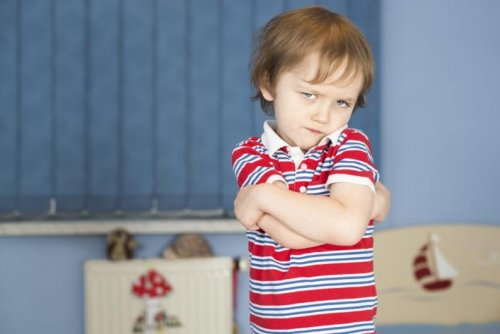Why Your Child Rejects You When You Reunite

We must admit that it’s a very hard feeling when your child rejects you when you reunite. It happens frequently to mothers and it’s difficult to understand. For mothers, it’s a moment of joy to be reunited with their children after having left them for a few hours. However, for some children, it seems like an annoyance. In the following article, we’ll take a deeper look at why this happens.
It’s confusing for little ones when their parents leave them at daycare or with a caretaker when they really want to be with them. Showing their discomfort and rejecting them at first is a kind of revenge for their supposed abandonment. It’s something that can hurt a lot, but usually, it doesn’t last that long.
After having spent so much time without separating, parents and children achieve a deep attachment; however, the time comes when separation is necessary. This readjustment period can be very hard for both parties, with the difference that adults understand it better.
Why does your child reject you when you reunite?
Just because your child rejects you when you reunite doesn’t mean they’re sad you’re back. Although it may not seem like it, children feel relieved and happy to see that their parents are back with them, even though they don’t exactly show it.
Therefore, it’s very likely that the distance they put -sometimes accompanied by tantrums- has the purpose of getting your attention and, in some way, blaming you for leaving them alone.

When children protest this way, it means that they feel affected by the separation and is an indication that they miss us.
Therefore, the disapproval of your absence is the main reason for this momentary rejection; but their response also tells you that they’ve been okay during their hours with other people. If the children are anxious for your to come for them and show detachment or fear of their caregivers, it may be a sign that something is wrong.
That said, it’s a good idea to observe their reaction to others as well. Sometimes, it’s a matter of personality. Not all children will act in the same way. Sometimes, some parents accustom their children to frequently staying with their relatives or living with them, so it will be normal for them for you to go and come back; others are mature and independent enough to understand it.
According to psychologists, also for reasons of personality, some more insecure children may believe that they “deserve” it in some way. Therefore, it’s important that we observe their reaction if they get sad but don’t show the typical rejection.
So, if they seem to feel like they’re being left as a punishment, it’s wise to pay attention to their reaction, as it’s a sad sign of low self-esteem.
Is it normal that your child rejects you?
For experts, this is a normal reaction for children to show their disagreement about something they don’t like. But if not, we could be facing a bigger problem.
Psychologists explain that what the child is trying to express isn’t rejection as such, but distaste. It’s not that the child doesn’t want to be with you, on the contrary: They didn’t want you to leave them in the first place.

The normal thing would be that, shortly after you start leaving them, they get used to the routine, especially if they feel good with their caregivers. However, it’s important to maintain communication and talk to them all the time about the fact that things will continue to happen like this and that your love for them won’t change as a result.
Dedicating quality time to them, taking advantage of sharing with them while we’re available, could help them feel sure that their parents love them and are with them many times. It’s very important to reassure them and be very patient with their attitude because, rather than reprimand them for their reaction, it’s better to understand them sincerely.
We must admit that it’s a very hard feeling when your child rejects you when you reunite. It happens frequently to mothers and it’s difficult to understand. For mothers, it’s a moment of joy to be reunited with their children after having left them for a few hours. However, for some children, it seems like an annoyance. In the following article, we’ll take a deeper look at why this happens.
It’s confusing for little ones when their parents leave them at daycare or with a caretaker when they really want to be with them. Showing their discomfort and rejecting them at first is a kind of revenge for their supposed abandonment. It’s something that can hurt a lot, but usually, it doesn’t last that long.
After having spent so much time without separating, parents and children achieve a deep attachment; however, the time comes when separation is necessary. This readjustment period can be very hard for both parties, with the difference that adults understand it better.
Why does your child reject you when you reunite?
Just because your child rejects you when you reunite doesn’t mean they’re sad you’re back. Although it may not seem like it, children feel relieved and happy to see that their parents are back with them, even though they don’t exactly show it.
Therefore, it’s very likely that the distance they put -sometimes accompanied by tantrums- has the purpose of getting your attention and, in some way, blaming you for leaving them alone.

When children protest this way, it means that they feel affected by the separation and is an indication that they miss us.
Therefore, the disapproval of your absence is the main reason for this momentary rejection; but their response also tells you that they’ve been okay during their hours with other people. If the children are anxious for your to come for them and show detachment or fear of their caregivers, it may be a sign that something is wrong.
That said, it’s a good idea to observe their reaction to others as well. Sometimes, it’s a matter of personality. Not all children will act in the same way. Sometimes, some parents accustom their children to frequently staying with their relatives or living with them, so it will be normal for them for you to go and come back; others are mature and independent enough to understand it.
According to psychologists, also for reasons of personality, some more insecure children may believe that they “deserve” it in some way. Therefore, it’s important that we observe their reaction if they get sad but don’t show the typical rejection.
So, if they seem to feel like they’re being left as a punishment, it’s wise to pay attention to their reaction, as it’s a sad sign of low self-esteem.
Is it normal that your child rejects you?
For experts, this is a normal reaction for children to show their disagreement about something they don’t like. But if not, we could be facing a bigger problem.
Psychologists explain that what the child is trying to express isn’t rejection as such, but distaste. It’s not that the child doesn’t want to be with you, on the contrary: They didn’t want you to leave them in the first place.

The normal thing would be that, shortly after you start leaving them, they get used to the routine, especially if they feel good with their caregivers. However, it’s important to maintain communication and talk to them all the time about the fact that things will continue to happen like this and that your love for them won’t change as a result.
Dedicating quality time to them, taking advantage of sharing with them while we’re available, could help them feel sure that their parents love them and are with them many times. It’s very important to reassure them and be very patient with their attitude because, rather than reprimand them for their reaction, it’s better to understand them sincerely.
All cited sources were thoroughly reviewed by our team to ensure their quality, reliability, currency, and validity. The bibliography of this article was considered reliable and of academic or scientific accuracy.
- Bowlby, J. (1986). Vínculos afectivos: formación, desarrollo y pérdida. Madrid: Morata.
- Bowlby, J. (1995). Teoría del apego. Lebovici, Weil-HalpernF.
- Garrido-Rojas, L. (2006). Apego, emoción y regulación emocional. Implicaciones para la salud. Revista latinoamericana de psicología, 38(3), 493-507. https://www.redalyc.org/pdf/805/80538304.pdf
- Marrone, M., Diamond, N., Juri, L., & Bleichmar, H. (2001). La teoría del apego: un enfoque actual. Madrid: Psimática.
- Moneta, M. (2003). El Apego. Aspectos clínicos y psicobiológicos de la díada madre-hijo. Santiago: Cuatro Vientos.
This text is provided for informational purposes only and does not replace consultation with a professional. If in doubt, consult your specialist.








